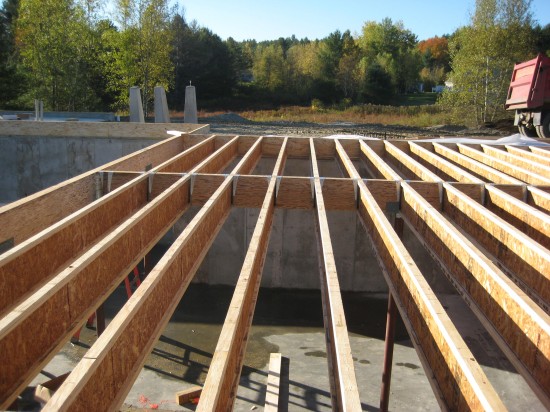Is Building To Code Enough?
Building To Code = Building To Bare Minimum Specifications
Somewhere along the line the general public has mistakenly been made to believe that building a home to meet code means that it’s built to some great standard. I hear it all the time; “this house was built to the latest code”, followed by a question of how could this happen if in fact that house was built to code.
In most cases that statement is almost completely the opposite in reality. Codes have been developed to define the absolute “MINIMUM” standard for safety. The code doesn’t address best practices or suggestions about better options. It simply sets a bottom threshold to be used as a minimum.
A few years ago I ran into a perfect example of this situation. A competitor was building a house right next to one we were building. The building inspector had just inspected the framing at the other house and stopped at our jobsite to inspect our framing. He was shaking his head with disgust as he walked up to me.
I asked him what he seemed so disturbed about. He said that the other house floor system was being framed with 2×8 floor joists at 16 inches on center and 5/8″ thick floor sheathing. I was completely shocked and asked him how on earth they could do that. He proceeded to pull out the Code book and show me that a 2×8 was acceptable for the span they had.
Obviously he and I both knew the floor was going to be like a spring board. The new owner would surely feel that floor bounce every time they walked across the floor. Compare that to the house we were building where our “minimum” specification is building a floor with 12″ deep engineered I-Joists and 3/4″ thick tongue and groove sheathing.
I could go on and on with examples of how crappy minimum code can be. The point here is twofold:
- Homeowners – You should insist that your builder give you several options from minimum code up to preferred building techniques. This should happen on all major building components. Ask enough questions to ensure your builder is keeping up with the latest products and techniques.
- Contractors – You need to set yourself above the average builder. To do that you have to insist that you build to a certain standard which is above the minimum required by law. You need to showcase and brag about your added services.
Recent Posts
Framing Stick Nailer vs Coil Nailer
Which is Better a Stick Nailer or Coil Nailer? Framers have many choices in nailers…
How Many Roofing Nails Per Square of Shingles
Estimating How Many Nails for a New Roof When it comes to estimating materials for…
Composite / PVC Decking – Layout Tips & Advice
Composite / PVC Decking Layout Tips and Advice Composite and PVC decking have really changed…
Benefits of an ERV System (Energy Recovery Ventilator)
Benefits of ERV Systems (Energy Recovery Ventilator) If you're building a new home or doing…
Vermiculite Attic Insulation Abatement
Vermiculite Attic Insulation If your home was built before 1990 there is a chance it…
Nuisance Tripping of AFCI (Arc Fault) Circuit Breakers
Arc Fault (AFCI) Circuit Breakers Tripping Often An arc-fault circuit interrupter (AFCI) or arc-fault detection…


View Comments
How do I go about obtaining the most simplified and up to date code that applies to building homes in my neck of the woods? I've keyword searched and located a list of codes state by state, but the breakdown by categories is immense and the info is textual and jargonistic. Who can I consult with that might be able to break it down for me in laymen's terms. Building codes are so intimidating for these reasons, and homeowners building from scratch, like myself, often don't know where to begin, let along dialogue with a contractor about info that is so detailed and esoteric. I posed this same question on zillow.com and have received some interesting comments. I thought I'd try this website, too.
Jackson - There's no denying the fact that the building codes have become incredibly complicated. Many of us professionals in the industry think they've become far too complicated. The old BOCA code was fairly simple and straight forward. Today the IBC has become as complicated as any of the more intense codes like Highway Bridges.
The sad truth is..you're not going to find much relief. Depending on what State, and frankly what City/Town you live in will determine ONE...and only ONE code. Depending on what code that is...you're going to be stuck with the result. If it's the IBC....good luck...it's huge...it's massive..and very cumbersome for someone like myself let alone a homeowner.
Your best bet...sit down with your local building code official...ask for advice.....95% of the time they are VERY helpful. Good luck.
It really is tragic that so few people understand how little the bare minimum will do for them when it comes to building a home that will last. I agree with the point you made near the end. Contractors should take some initiative in explaining the limitations of building codes, and explain the consequences of choosing the cheapest option. I'm not really sure why contractors would be willing to offer the minimum anyway. They must realize that shoddy standards will reflect on their craftsmanship more than it reflects on the law.